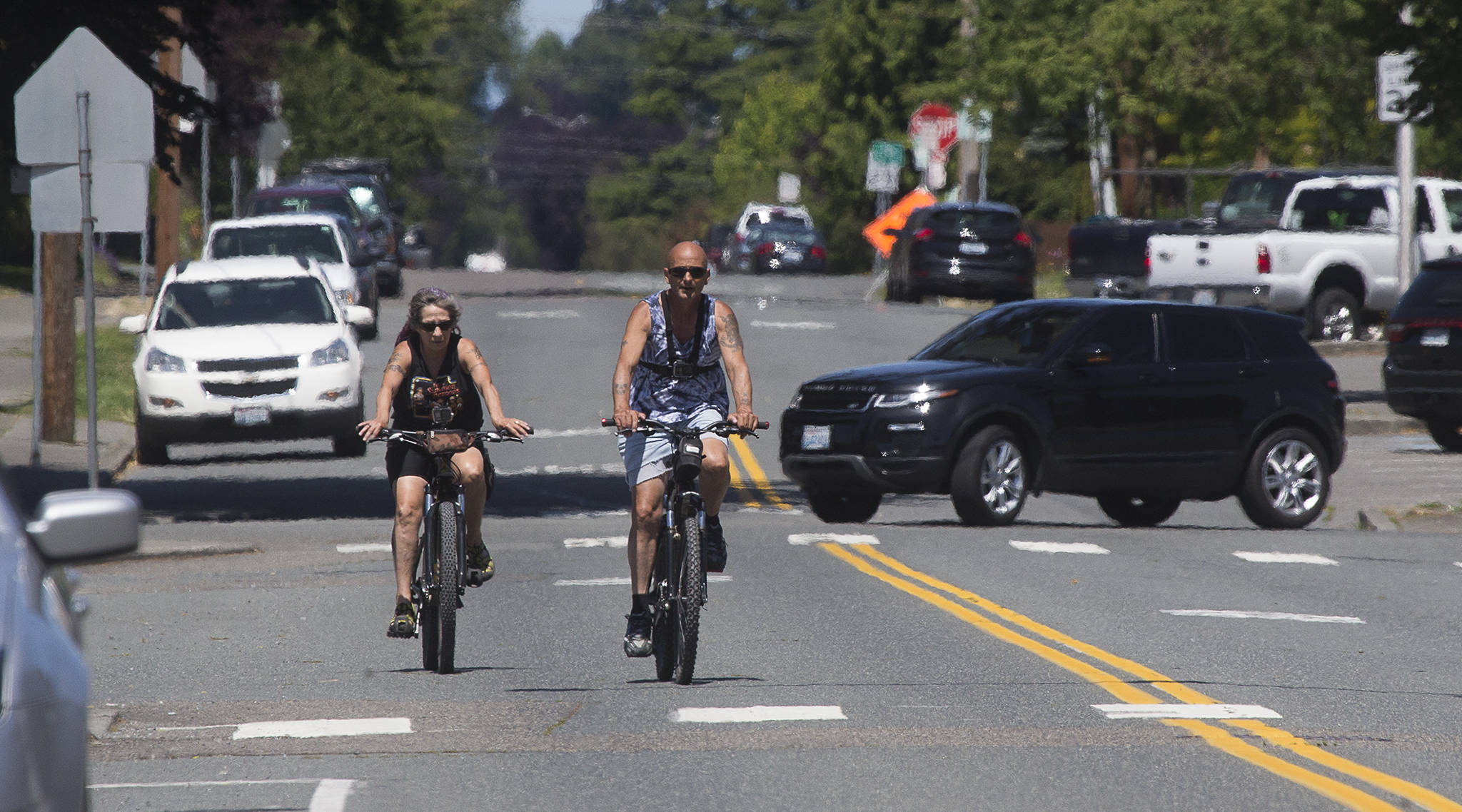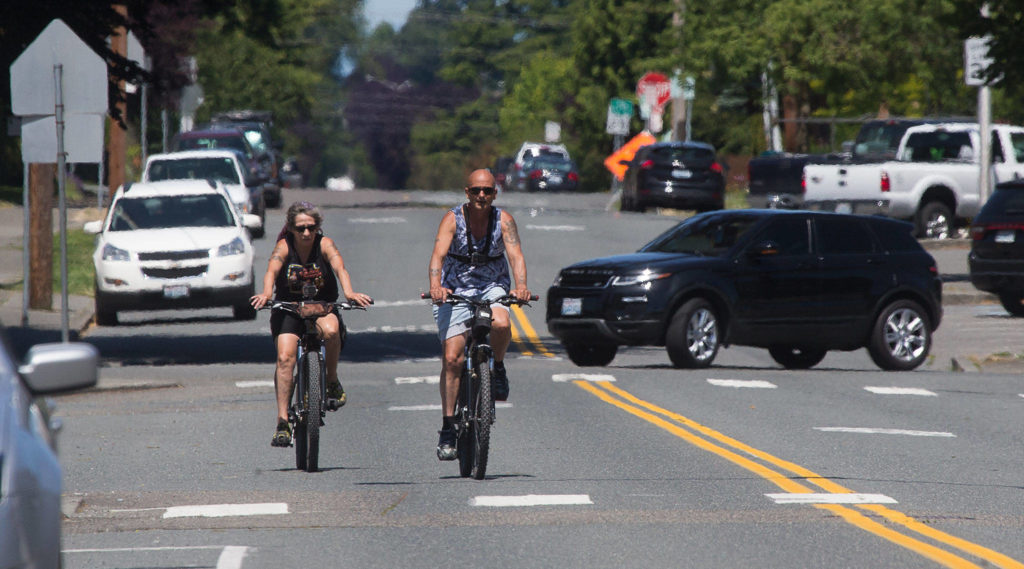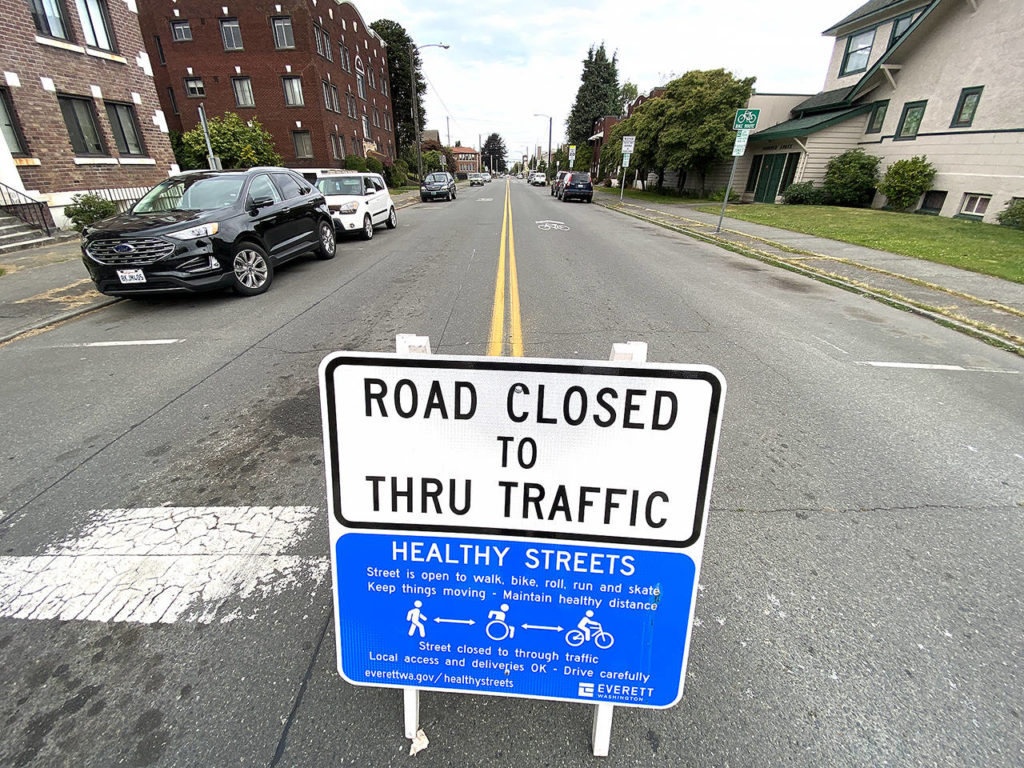EVERETT — Four streets in different neighborhoods are set for bike, pedestrian, scooter, skate and local access only.
Similar to Seattle, Edmonds and Bothell, Everett plans to block through traffic, starting Thursday. Everett’s Healthy Streets Program will affect stretches of Commercial Avenue, Hoyt Avenue and Silver Lake Road. It’ll end once Everett moves to phase four of the state’s Safe Start plan.
People who live and work along the segments can still get in and out, and emergency response vehicles and delivery drivers can access the streets as well.
City leaders aim to encourage active transportation — replacing vehicle trips with non-motorized jaunts “to get out, get fresh air and get moving.”
“Our goal with Healthy Streets is to create more opportunities close to home for our residents to get outside biking, hiking, skating and scooting while keeping a safe distance from others,” Mayor Cassie Franklin said in an email. “With COVID-19 still impacting our community — and country — summer travel plans are on hiatus for many people. Healthy Streets allows residents to have an active staycation here, and safely explore more of our community and everything Everett has to offer. I’m looking forward to biking around with my family.”
Two parts of Hoyt Avenue are set to close: between 19th Street and Everett Avenue, and from 32nd Street to 38th Street. In the Glacier View and Pinehurst neighborhoods, Commercial Avenue between 55th Street and Madison Street won’t allow through traffic. Farther south, passing vehicles can’t enter the arc of Silver Lake Road at 19th Avenue Southeast.
Staff are tracking expenses and their time, but it’s estimated to cost between $20,000 and $25,000 for materials and labor.
The city chose the roads — all on Everett’s Bicycle Master Plan, a document guiding the city’s bike transportation improvements — based on low traffic volume and alternative routes nearby.
“We did not want to increase traffic on adjacent local streets,” Everett traffic engineer Corey Hert said in an email.
Ann Morgan, a bike and pedestrian advocate in Everett, said vehicle restrictions for roads are positive for health, the environment and community.
“There’s just a huge benefit to the population in the city overall by encouraging people to walk and bike instead of drive,” she said. “It’s less noise, it’s less traffic, it’s less oil and grease on the streets, less accidents.”
During the coronavirus pandemic, most forms of physical activity at least changed, if they didn’t cease. Basketball gyms are closed. Workout centers are restricted by the number of people they can admit at a time. Playgrounds and pools closed for months, some indefinitely. Even camping and hiking were prohibited for a time.
More people began biking, blading, scooting, skating and walking, here and across the United States. Aside from sidewalks, Everett has several marked bike paths.
Making streets friendlier for non-motorized use is a long time coming, but the city’s program should go further, Tyler Rourke said. He is a bike and pedestrian advocate who serves on the Everett Transportation Advisory Committee.
“I think what they’re proposing is all good stuff, but they’re kind of overlaying it on stuff that’s already existing and doesn’t have an issue,” he said.
As an example, he noted the Commercial Avenue closure already has a bike path — Interurban Trail — on it.
“The street is already quiet and safe,” Rourke said. “You’ve already got bike lanes on it. I don’t understand what the benefits are.”
Once Everett launches the Healthy Streets Program, Rourke said he’ll use it. But he and his family already bike on Hoyt Avenue from their home into downtown or pedal along the Interurban Trail.
He wants road closures on more short segments across Everett, especially in the south end of the city. Rourke asked city staff to let people request road closures as part of the Healthy Streets Program. That idea wasn’t incorporated when it launched.
“Most people need space outside their front door,” Rourke said.
The roads will reopen once Everett and Snohomish County enter phase four of the state’s phased reopening. There aren’t plans to expand to other streets.
Morgan was disappointed the downtown core wasn’t included. She had Colby Avenue around Hewitt Avenue on her road-closure wish list.
“I know that’s a major traffic thoroughfare, but there are side streets,” she said. “That’s where your restaurant core is.”
Edmonds has kept traffic from its downtown corridor on weekends. Restaurants can sprawl out into the road while adhering to distance guidelines between people in an open-air setting.
Business owners’ reactions have been split, Edmonds Chamber of Commerce President Greg Urban said. Overall, he considers it a necessary benefit.
“Doing something is better than not doing anything,” he said.
Liz Stenning, executive director of the Downtown Everett Association that represents dozens of businesses, said the street closure skipping downtown was helpful for now. Business owners have complained and struggled during the extended work on Rucker Avenue. Another road closure at the same time could hurt their revenues further.
Stenning and the DEA staff have noticed more people walking around town already. She hopes the city’s program entices people to stroll in and spend money.
“We’re not seeing it so much as a street closure as opening it up for bicyclists and people to walk around downtown,” she said. “I would hope that it would encourage more residents who live just outside of downtown to come in to those streets.”
Parking and spending don’t have to be at odds, Rourke said. Hewitt has two lanes in each direction, east and west. One lane could be repurposed for parking, freeing existing parking space for sidewalk cafes or pedestrian use, he said.
But the city’s criteria dings streets with angled parking, which comprises most of Colby’s on-street spots. Hewitt’s spots are all parallel parking.
Morgan said she wondered what result would come to parking around Everett’s closed streets, especially near downtown on Hoyt Avenue.
Everett officials have heard gripes about street parking spots, and a recent commissioned study recommended greater enforcement and other measures.
Urban, the Edmonds Chamber of Commerce president, said parking is a matter of perception.
“You look at downtown Seattle, nobody gets to park in front of the store they’re going to,” he said. “You park, get out and walk.”
Ben Watanabe: bwatanabe@heraldnet.com; 425-339-3037; Twitter @benwatanabe.
Talk to us
> Give us your news tips.
> Send us a letter to the editor.
> More Herald contact information.



























